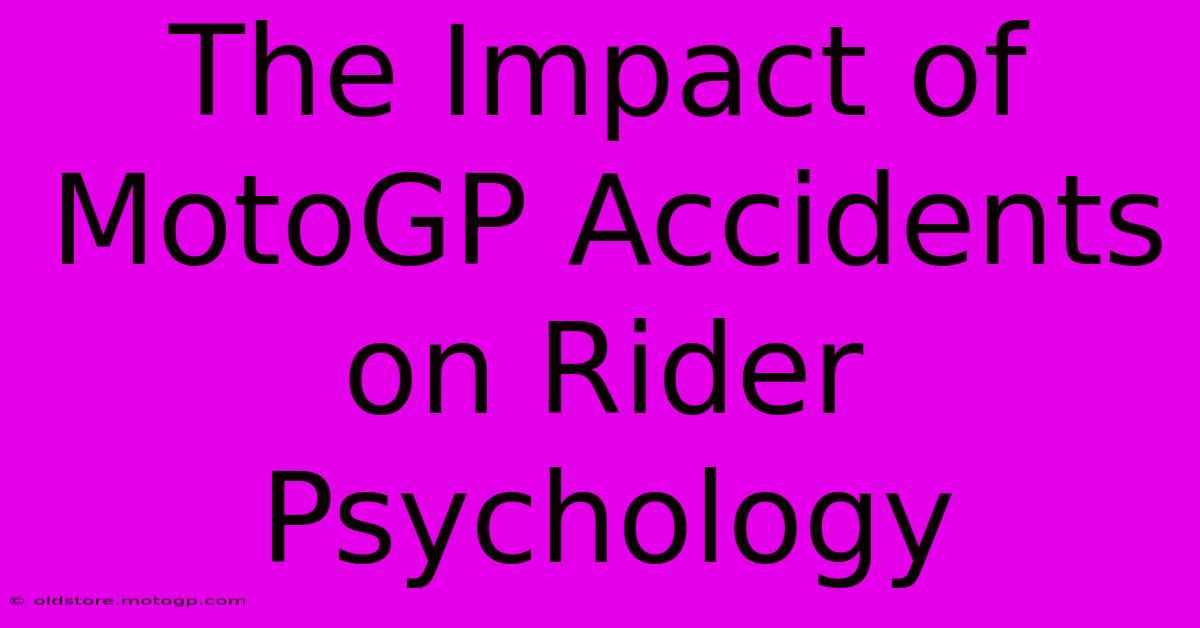The Impact Of MotoGP Accidents On Rider Psychology

Table of Contents
The Impact of MotoGP Accidents on Rider Psychology
Motorcycle racing, particularly at the elite level of MotoGP, is a high-stakes sport demanding incredible skill, precision, and unwavering mental fortitude. While the thrill of speed and competition draws riders in, the inherent danger casts a long shadow, significantly impacting their psychological well-being. Accidents, even minor ones, can leave lasting effects on a rider's confidence, mental resilience, and overall approach to the sport. This article delves into the profound psychological impact MotoGP accidents can have on riders.
The Immediate Aftermath: Shock, Fear, and Pain
The immediate aftermath of a MotoGP crash is often chaotic and traumatic. The sheer force of impact, the potential for serious injury, and the adrenaline surge create a potent cocktail of emotions. Shock is a common initial response, followed by intense fear and the agonizing physical pain of injuries, both visible and hidden. This immediate experience can be deeply unsettling, triggering a fight-or-flight response that profoundly affects the rider's mental state.
PTSD and Anxiety: Long-Term Consequences
For some riders, the trauma doesn't end with the immediate aftermath. The experience can contribute to the development of Post-Traumatic Stress Disorder (PTSD). Symptoms can include flashbacks, nightmares, avoidance of situations reminiscent of the accident, and heightened anxiety. The constant risk of further accidents inherent in MotoGP further exacerbates these anxieties, creating a vicious cycle of fear and apprehension.
Loss of Confidence and Self-Doubt
A significant psychological impact of MotoGP accidents is the erosion of confidence. Riders pride themselves on their skill and precision, and a crash can shatter that self-belief. Doubt creeps in, questioning their abilities and jeopardizing their performance. This loss of confidence can manifest as hesitancy on the track, leading to further mistakes and a decline in competitive performance. Self-doubt becomes a formidable opponent, as challenging to overcome as any rival on the track.
The Mental Strength of Recovery: Strategies and Support
The road to recovery after a MotoGP accident is rarely straightforward. It demands immense mental strength, resilience, and unwavering support from team members, medical professionals, and loved ones.
Cognitive Behavioral Therapy (CBT) and Mindfulness
Professional help is often crucial. Cognitive Behavioral Therapy (CBT) can be incredibly beneficial in helping riders process their trauma, challenge negative thoughts, and develop coping mechanisms for anxiety and fear. Mindfulness techniques, such as meditation, can help riders regain focus, manage their emotional responses, and enhance their self-awareness.
Physical Rehabilitation and Gradual Return to Racing
Physical rehabilitation plays a pivotal role, not just in healing physical injuries, but also in rebuilding confidence. As riders regain their physical capabilities, they can gradually return to training and racing, rebuilding their skills and confidence step-by-step. This gradual approach, often supported by sports psychologists, is essential to prevent setbacks and ensure a safe and sustainable return to the sport.
The Importance of Support Systems
The mental health of MotoGP riders is paramount. The sport needs to prioritize the well-being of its athletes, recognizing the psychological toll of accidents. Teams should provide comprehensive support systems, including access to mental health professionals, sports psychologists, and counselors. Open communication, understanding, and a compassionate approach are vital to ensuring that riders receive the help they need to overcome the psychological challenges of their profession. A strong support system isn't just beneficial; it's crucial for long-term physical and mental health.
Conclusion:
MotoGP accidents have a profound and multifaceted impact on rider psychology. From immediate trauma and anxiety to long-term mental health challenges, the psychological consequences are significant. Addressing these challenges requires a multi-pronged approach, involving robust support systems, professional psychological help, and a culture that prioritizes the well-being of these incredibly skilled and courageous athletes. The future of MotoGP depends not only on their physical prowess but also on their mental resilience and the support they receive.

Thank you for visiting our website wich cover about The Impact Of MotoGP Accidents On Rider Psychology. We hope the information provided has been useful to you. Feel free to contact us if you have any questions or need further assistance. See you next time and dont miss to bookmark.
Featured Posts
-
Beyond The Podium The Making Of A Moto Gp Legend
Feb 21, 2025
-
F1 Austin 2025 The Future Of Racing
Feb 21, 2025
-
Moto Gp Racing Time Share Your Passion
Feb 21, 2025
-
Inside The Moto Gp Sprint Race A Riders Perspective
Feb 21, 2025
-
The Aero Impact Shaping The Future Of Moto Gp
Feb 21, 2025
